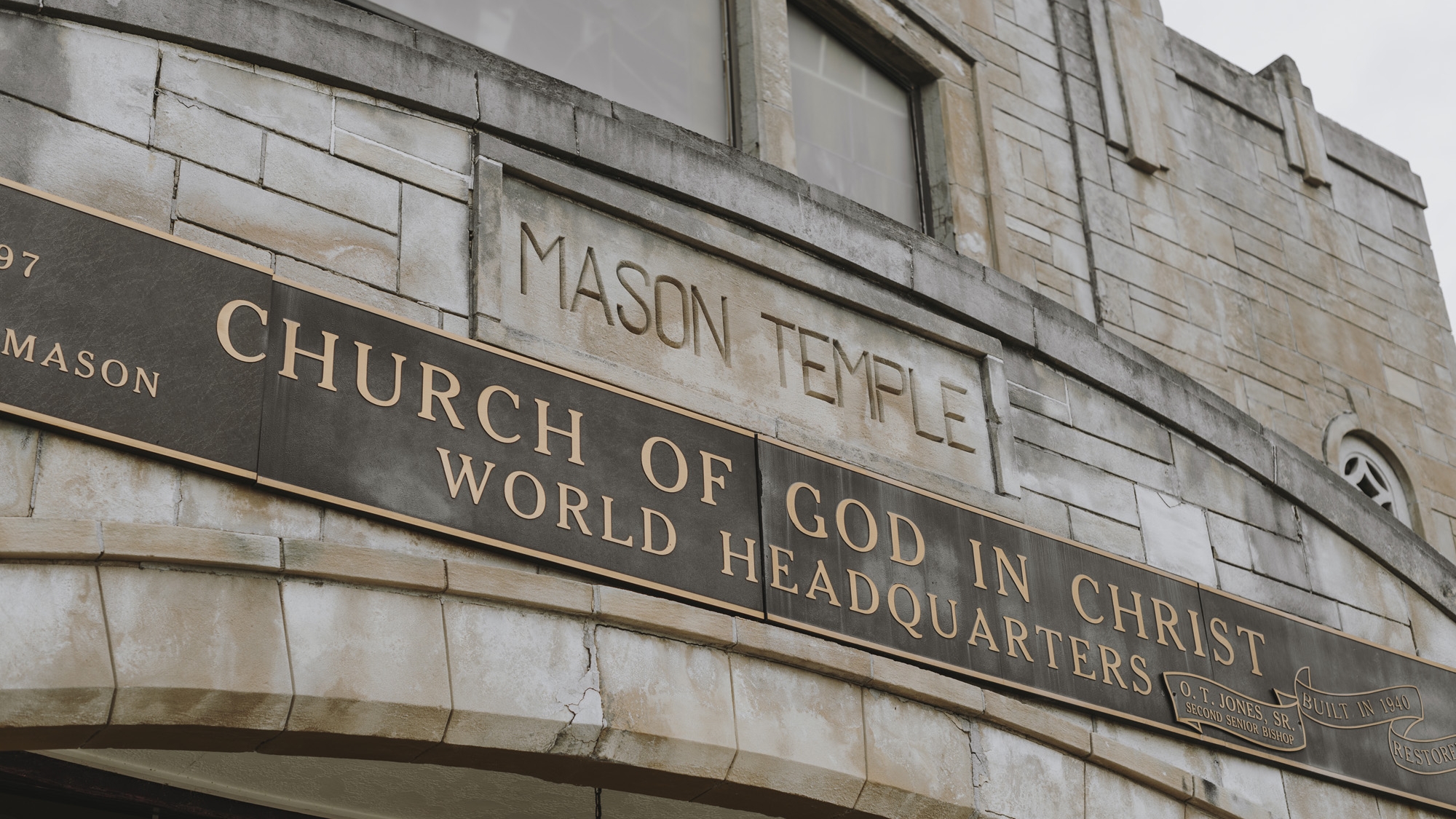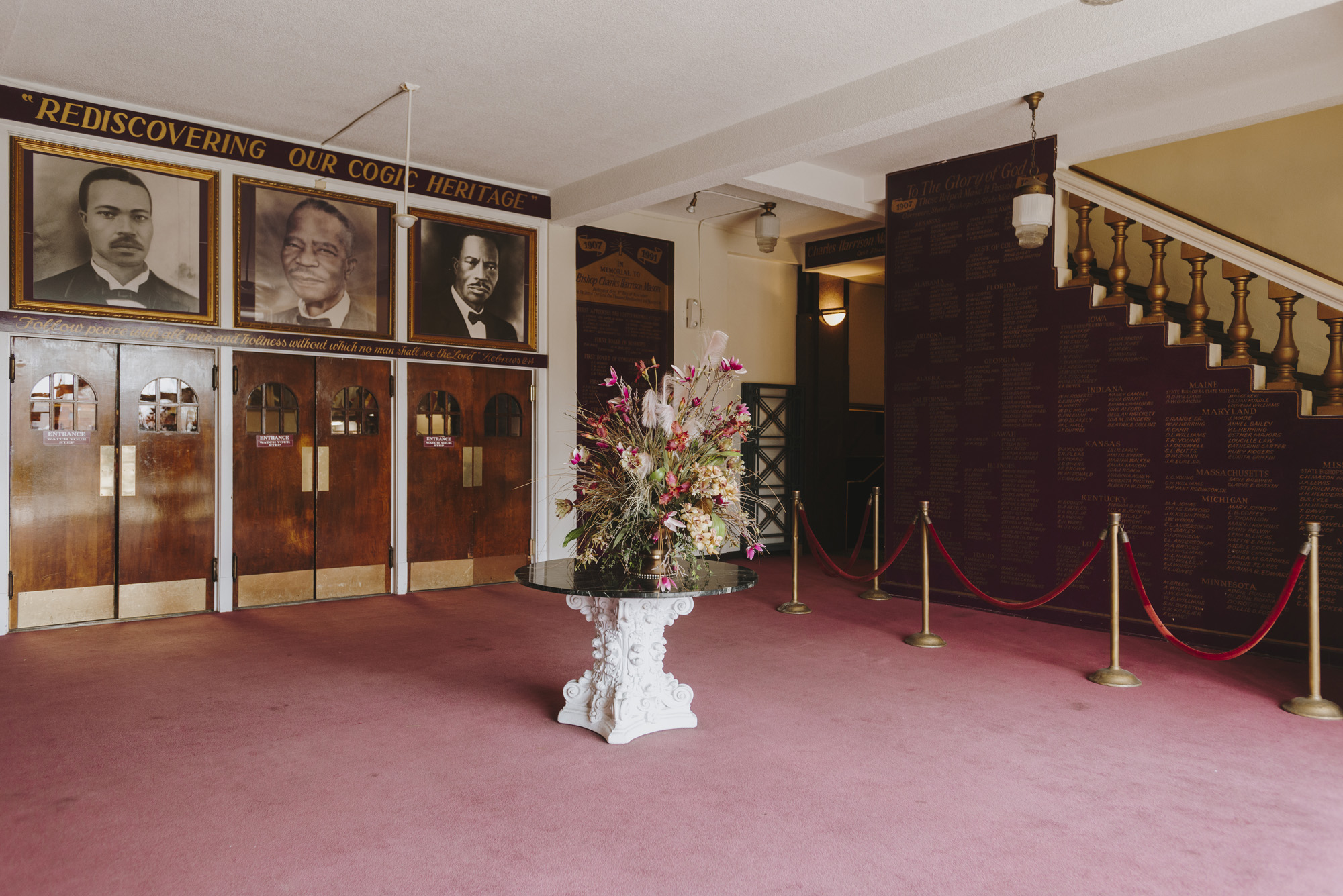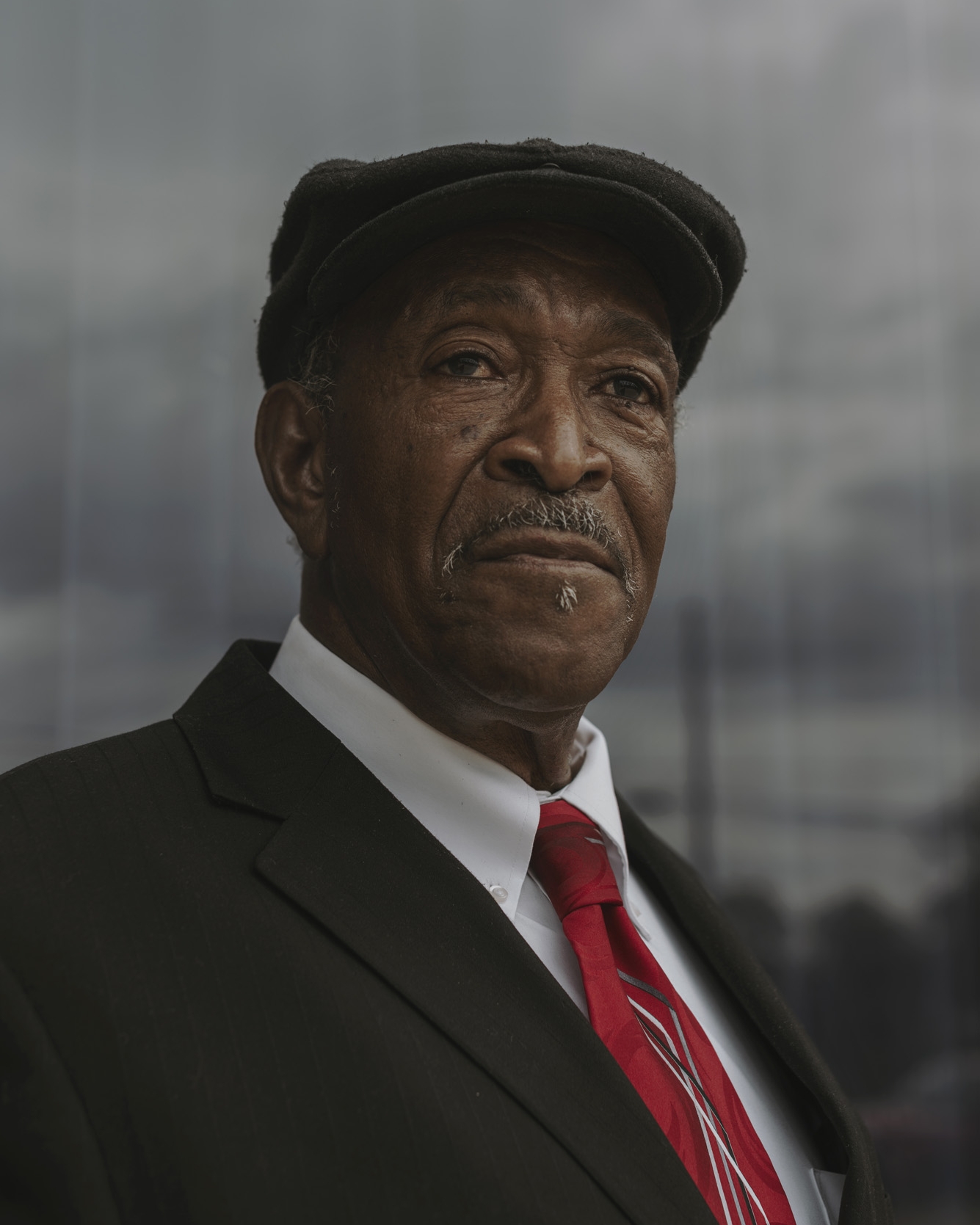Fifty years ago today, the night before his assassination, the Rev. Dr. Martin Luther King Jr. arrived in Memphis to help 1,300 African-American sanitation workers who had been on strike for almost two months. Ozell Ueal, now 78 years old, was one of them, and was in the audience when King delivered the final speech of his life — “I Have Been to the Mountaintop” — the night before he was killed. Today, Mr. Ueal remembers.
Story by Tonyaa Weathersbee | Photographs by Houston Cofield
Ozell Ueal outside Mason Temple Church of God in Christ
On a recent Friday in Memphis — a day when solemn, gray clouds threatened to burst into tears of rain — Ozell Ueal took a seat outside Mason Temple Church of God in Christ where, on April 3, 1968, the weather signaled similar foreboding.
“It rained and thundered something awful that night,” said Ueal, now 78 years old. “It stormed awfully bad. . .”
Yet the cause that drew Ueal and his wife, Florence, to the church to listen to the Rev. Dr. Martin Luther King Jr.’s last speech 50 years ago proved to be stronger than the thunderstorm that kept some people away.
At that time, Ueal was one of 1,300 African-American sanitation workers who had been on strike since February 11. Their aim: to stop Mayor Henry Loeb and the city’s white power structure from continuing to treat them lower than the garbage they carried on their heads, their shoulders, and their hips — putridness that seeped into their skin, their clothing, and ultimately their souls.
Mason Temple Church of God in Christ, Memphis Tennessee
“They didn’t treat us right . . . we needed better working conditions,” said Ueal. “I had to have (cortisone) shots in my shoulder from years of carrying those heavy tubs . . .”
These days, Ueal’s memory of those anxious yet anticipatory days are fading, along with his eyesight. He was scheduled to have cataract surgery soon after we spoke. This week, Memphis is deluged with celebrities, activists, and media there to commemorate April 4 — the 50th anniversary of when King was killed on the balcony of the Lorraine Motel by sniper James Earl Ray.
While he fights for his eyesight, the aches in Ueal’s shoulder still remind him of those days in 1968, when he and his colleagues’ marches for better wages and working conditions were met with tear gas and billy-club beatings. The ache in his heart reminds him of that thunderous night when he was among hundreds who packed the Mason Temple’s pews to hear King lay out his vision not only for the future of Memphis’ sanitation workers, but for a nation that needed to realize the humanity of all workers.
What Ueal also heard, though, was a speech that concluded with an eerie finality.
Well, I don't know what will happen now. We've got some difficult days ahead. But it really doesn't matter with me now, because I've been to the mountaintop. And I don't mind. Like anybody, I would like to live a long life. Longevity has its place. But I'm not concerned about that now. I just want to do God's will. And He's allowed me to go up to the mountain. And I've looked over. And I've seen the Promised Land. I may not get there with you. But I want you to know tonight, that we, as a people, will get to the promised land!
“That’s when I knew,” Ueal said. “What he said, and that bad storm, all of that was a sign.”
Inside the Mason Temple Church of God in Christ
King had come to Memphis to help workers like Ozell Ueal. He was there to amplify their voices over the din of paternalism masquerading as law and order created by Mayor Henry Loeb, who often referred to the black sanitation workers as “my Negroes.“
Loeb, though, didn’t hesitate to unleash the police and tear gas canisters on “my Negroes” and their supporters in February and March of 1968, as the sanitation workers marched for the right to go home without needing to shake maggots out of their clothes (black workers weren’t allowed use of the showers) — and to be paid enough money to feed their families without also relying on welfare assistance.
To Ueal, King was the man to help them to raise their voices. He would show them how to assert themselves in a society where black people were expected to protect the peace at the price of suppressing their pain.
“I had heard about him, heard what he had done in Selma and in Montgomery, and I was glad that he came here to help us,” Ueal said.
Five years earlier, at the 1963 March on Washington for Jobs and Freedom, King had fixed the nation’s attention on the plight of black people suffocating in the dank closet of segregation. Then, in 1964 and in 1965, the movement King led forced President Lyndon B. Johnson to sign the Civil Rights and Voting Rights acts.
King’s successes in rousing the oppressed to take charge of their plight by taking to the streets wasn’t lost on Memphis’ sanitation workers. King’s idea that resisting segregation and second-class treatment wasn’t rooted only in trying to achieve a more comfortable existence, but also to exact respect for themselves as men, held great power among the strikers. In his book “Why We Can’t Wait,” King had elaborated on the pervasiveness of such disrespect in the South.
When your first name becomes “nigger,” and your middle name becomes “boy” (however old you are) and your last name becomes “John,” and when your wife and mother are never given the respected title “Mrs.,” when you are harried by day and haunted by night by the fact that you are a Negro, living constantly at tiptoe stance, never quite knowing what to expect next, and plagued with inner fears and outer resentments; when you are forever fighting a degenerating sense of "nobodyness" — then you will understand why we find it difficult to wait.
In the Memphis of 1968, sanitation was one of the few industries hiring young black men. If a black man in his late teens or early 20s sought to prove his manhood, working in sanitation was one way to do that.
“I was 20, but I set my age up to 21,” Ueal said. “I needed a job. That’s how I got hired.”
And a few years later, when the strike began, Ueal and his colleagues carried signs that claimed starkly, “I AM A MAN.”
Fifty years ago: Memphis sanitation workers on strike, carrying signs that became iconic symbols of the Civil Rights Movement.
In a 2000 article titled “I Am a Man: Race, Masculinity and the 1968 Memphis Sanitation Strike,” labor rights professor Steve Estes examined the role that assertions of manhood played in powering the strike. Wrote Estes:
The slogan resonated with the sanitation workers, in part, because it echoed a theme of the Delta blues that had pumped out of Beale Street clubs and juke joints since before World War II. Blues music had followed the migration of black sharecroppers from the farms and plantations of the Mississippi Delta to manufacturing and service jobs in cities like Memphis and Chicago. Blues guitar players like B.B. King and Muddy Waters electrified African-American urban audiences in the 1950s with a new, amplified version of the acoustic blues that they had learned growing up in the Delta. Although King set the tempo for the Beale Street beat, Waters’ Chicago blues recordings popularized the genre nationwide and dealt directly with African-American manhood.
Untitled (I Am a man) by glenn ligon
The title of Waters’ s song “Mannish Boy,” recorded in 1955, captured the ambiguous position of black men in America during the 1950s. This slow blues ballad began with a black mother telling her 12-year-old son that he would one day be the greatest man alive, but at the age of 21, the son realized that though he felt like a man, people continued to perceive him as a boy.… With the chorus, Waters refuted those who questioned black manhood, belting out, “I’m a man, spelled M-A-N!” and punctuating each line with instrumental breaks and a responsive chorus sung by female vocalists….
Waters and other bluesmen laid the cultural foundations for demands of respect for African-American manhood made by political activists during the 1960s. Drawing on the same gender and racial dilemmas that concerned Waters, [union] organizer Bill Lucy’ s “I Am a Man” slogan galvanized the sanitation workers in support of a challenge to white economic and political hegemony in Memphis.
But as Ueal would learn, if you were black, being young and strong was not enough to be considered a man in the Memphis sanitation department. Each day brought infinite indignities — like being paid a half day’s wages when the weather wouldn’t cooperate with the trash pickup routine. Worse, the workers only made $1.03 an hour.
Being unable to care for his family without government help did little to bolster Ueal’s sense of manhood.
“I took that dollar and three cents and fed my family, but at one time, we had to go on food stamps,” Ueal said. “It was rough at that time.”
Inside the temple.
In February of 1968, two of Ueal’s coworkers, Robert Walker and Echol Cole, were killed on the job when they took shelter from the rain on the back of a dilapidated garbage truck. Ueal and others decided that being quiet wouldn’t get them safer trucks, or pay raises, or simple dignities like new garbage tubs that wouldn’t leak on them.
So, they walked off the job. In the coming days, they donned their I AM A MAN signs and marched to ensure those who would just as soon regard them as props instead of humans would take notice.
But on February 23, their demands for dignity were treated as defiance; the police lobbed tear gas and racial slurs at them. Then, on March 28, during a march that King came to town to lead, violence erupted when some young black demonstrators, frustrated by the slow pace of progress, began to throw objects and break windows.
A 16-year-old, Larry Payne, was killed during the unrest — which gave Loeb an excuse to declare martial law and unleash the police on demonstrators.
King, though, was undeterred. He returned to Memphis on April 3 to bolster the strikers’ march for dignity and dollars — and manhood. He spoke at Mason Temple, in front of thousands of supporters of Ueal and his compatriots.
The Rev. Dr. Martin Luther King Jr. delivered the final speech of his life from this podium.
King’s speech began with this:
I'm delighted to see each of you here tonight in spite of a storm warning. You reveal that you are determined to go on anyhow. Something is happening in Memphis; something is happening in our world. And you know, if I were standing at the beginning of time, with the possibility of taking a kind of general and panoramic view of the whole of human history up to now, and the Almighty said to me, "Martin Luther King, which age would you like to live in?" I would take my mental flight by Egypt and I would watch God's children in their magnificent trek from the dark dungeons of Egypt through, or rather across the Red Sea, through the wilderness on toward the promised land. And in spite of its magnificence, I wouldn't stop there . . .
From there, King took the crowd with him on mental flights through ancient Greece, the Roman Empire, the Renaissance, the Reformation, the Civil War, and the Great Depression, only to conclude . . .
Strangely enough, I would turn to the Almighty, and say, "If you allow me to live just a few years in the second half of the 20th century, I will be happy." Now that's a strange statement to make, because the world is all messed up. The nation is sick. Trouble is in the land; confusion all around. That's a strange statement. But I know, somehow, that only when it is dark enough can you see the stars. And I see God working in this period of the 20th century in a way that men, in some strange way, are responding. Something is happening in our world. The masses of people are rising up. And wherever they are assembled today, whether they are in Johannesburg, South Africa; Nairobi, Kenya; Accra, Ghana; New York City; Atlanta, Georgia; Jackson, Mississippi; or Memphis, Tennessee — the cry is always the same: "We want to be free."
But it was the ending of the speech that stuck with Ueal.
And then I got into Memphis. And some began to say the threats, or talk about the threats that were out. What would happen to me from some of our sick white brothers? Well, I don't know what will happen now. We've got some difficult days ahead. But it really doesn't matter with me now, because I've been to the mountaintop.
“I was just going there, expecting to hear a speech, a great speech,” he said. “I knew about him, and I knew he had come out of Montgomery and had led the movement there, so I wanted to hear him speak here, to us and what we were trying to do. But when he made that mountaintop speech, he was trying to tell us something. That storm was trying to tell us something, that something was about to happen. That storm came up for a reason. I thought it was a sign that he wasn’t going to be with us much longer.”
The next day, King was killed.
The inside of Mason Temple was off-limits to the public recently in preparation for the deluge of events and visitors expected to descend this week on the place where King spoke what turned out to be the last words — the ending of his life’s final chapter. So, Ueal and I sat on the steps, just inside the gate, to chat. I was not the only person who wanted to talk to him, to remember.
“People are steady calling, two or three times a day,” he said.
Amid obligations like doctor’s appointments for his wife, funerals, and his own upcoming surgery, Ueal still made time to visit the place and talk about his last memories of King. He understands his role as a witness to history, so he spares what time he can to summon his recollections of the last night of King’s life.
It was a night when King spoke both encouragingly and prophetically, when he professed his belief in a promised land of justice for black people, but laid out his skepticism about whether he would reach that land alongside them.
It was also a night when Ueal was reminded, once again, of what real men do — and what he and his fellow strikers, as real men, had done. They fought belittlement. They fought being diminished by being called “boy.” They fought it while choking on tear gas and tasting their own blood, beaten out of them by police batons.
For years, King had helped fight such struggles with his words and his actions. But the next day, the fight would claim his life. Four days after that, his widow, Coretta Scott King, and the Southern Christian Leadership conference led a silent march of more than 40,000 people through the streets of Memphis.
Ten days later, the city of Memphis agreed to recognize the sanitation workers’ union and to raise their pay.




















